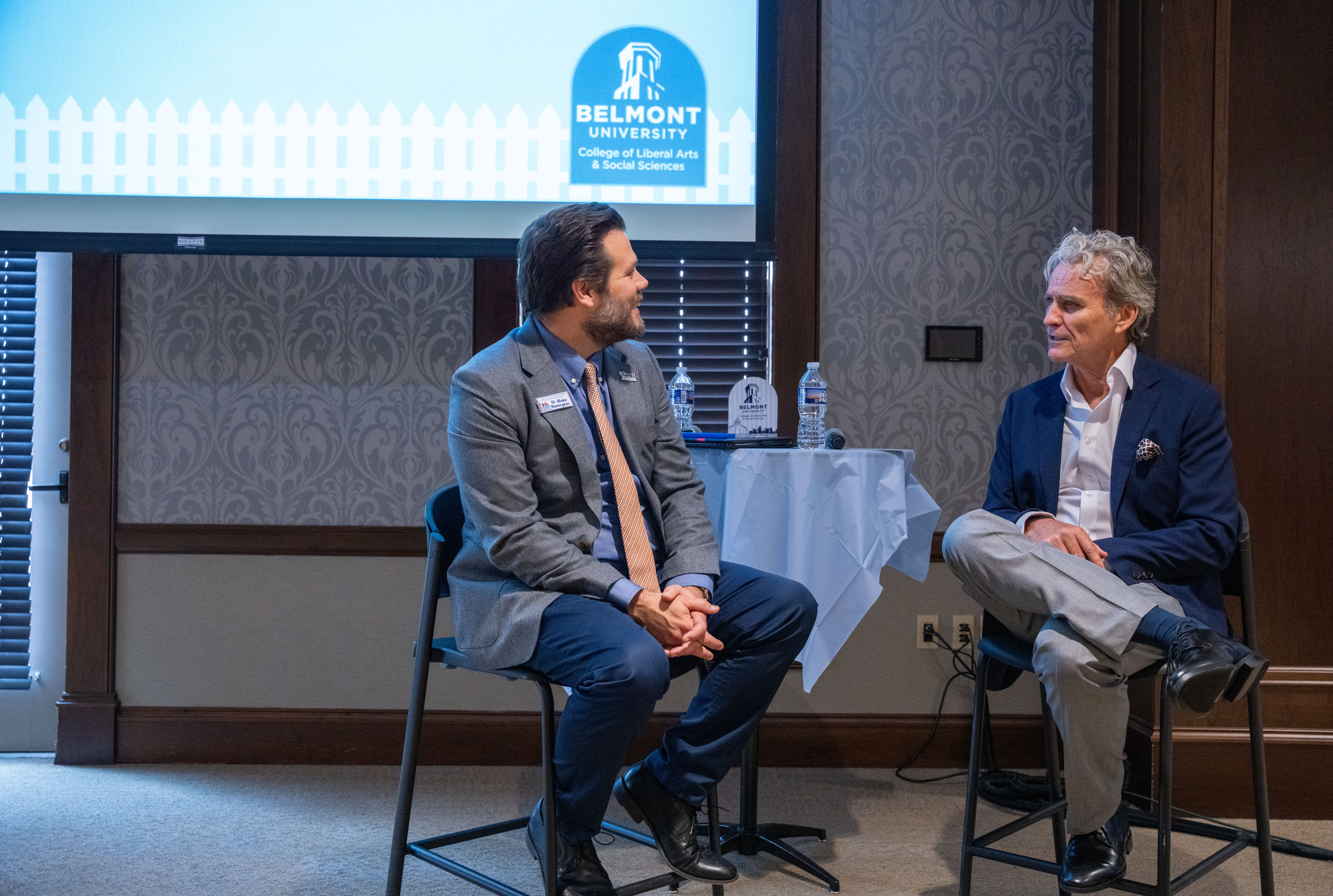Voices from the Humanities Symposium reflect on neighborliness, hospitality and human connection.
What does it mean to be a neighbor? Do we have the responsibility to care for our neighbor? Who is our neighbor?
These questions and more were explored at the College of Liberal Arts and Social Sciences’ annual Humanities Symposium. Since 2001, the School of Humanities has hosted this week-long series of interdisciplinary talks, panel discussions and activities, all with the purpose of connecting over core human experiences. This year’s theme, Neighbors, invited Belmont’s community to engage in fruitful conversation and grapple with what it means to be a neighbor in today’s social and cultural landscape.
“When we selected this topic more than a year ago, in part for its connection to the holocaust-related exhibit that would be coming to Belmont this fall, we were all aware of how socially, politically and personally fragmented we have become as a society,” said Dr. Maggie Monteverde, professor of English. “However, I came away from the symposium with a sense of urgency and even a bit of hope about the human need and ability to welcome and nurture one another in unexpected ways.”
The symposium welcomed four keynote speakers to engage audiences in discussions centered around the theme, and each day of the symposium corresponded with Belmont’s SOUL framework:
- Monday, Sept. 22: Seek Excellence with Humility
- Tuesday, Sept. 23: Offer Gratitude with Joy
- Wednesday, Sept. 24: Unleash Hospitality with Love
- Thursday, Sept. 25: Live the Dream Together with Hope
- Friday, Sept. 26: Living with SOUL
Each piece of the SOUL framework reflects the spirit of neighborliness, capturing the heart and meaning behind the week’s theme.
The Impact of Humankind(ness) 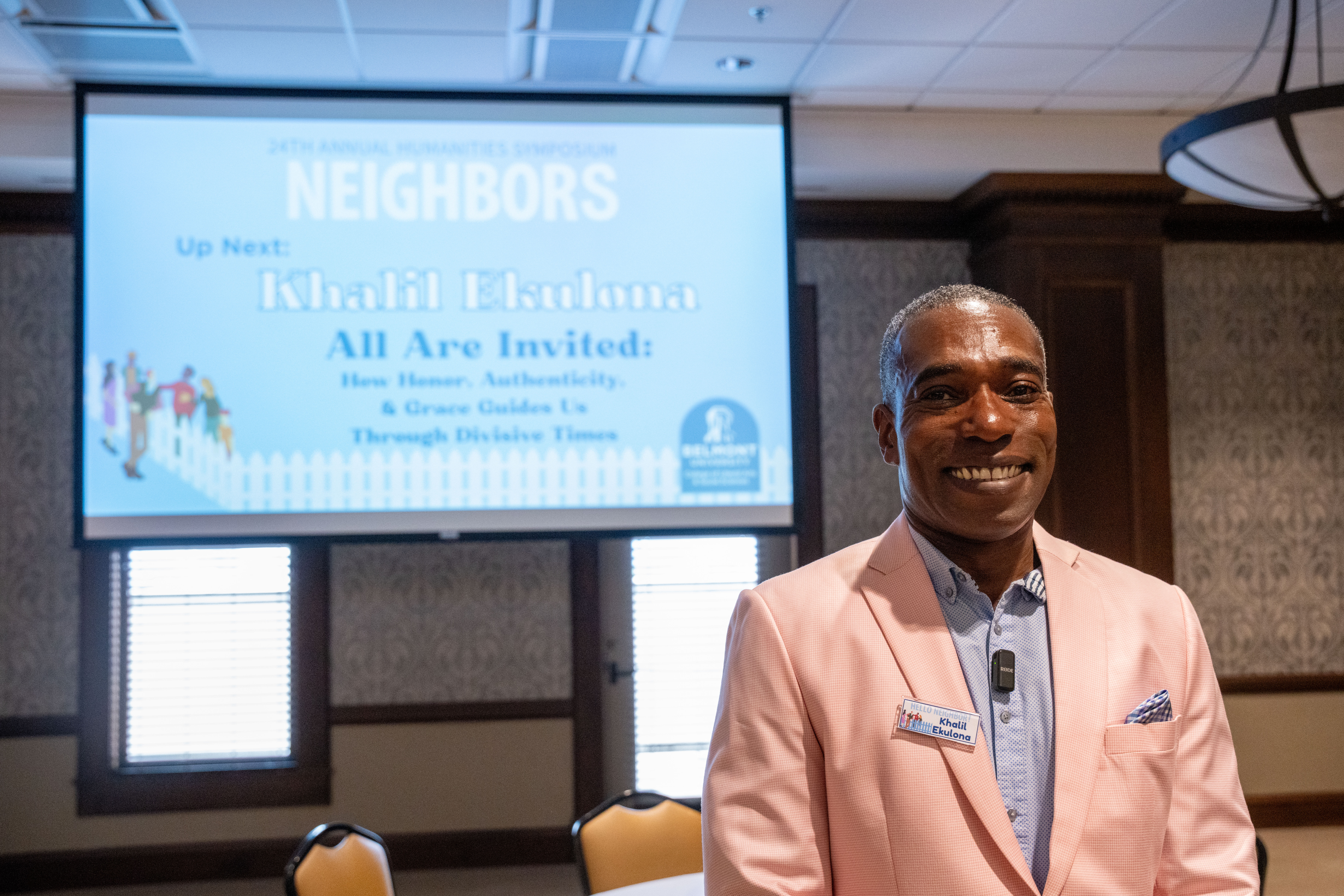
Monday’s keynote speaker and broadcaster Khalil Ekulona opened the conversation on what it means to be a neighbor and how we should engage with those around us. Sharing stories from his own life, he spoke about the many neighborhoods he’s lived in and the diverse mix of people he’s met along the way, each leaving their own mark.
“Common courtesy is a beautiful version of grace,” Ekulona said. “It serves as a gift and resource of being a decent human being towards others.”
As he spoke, the room was invited to think about the everyday ways we show up for our neighbors. For Ekulona, it’s even the small, respectful exchanges and unspoken understandings that form the real foundation of civic life.
“You are going to have neighbors,” Ekulona said. “You may not get along with them constantly, or maybe not at all. But if you act with honor, patience and love, and you approach your neighbor with excitement, authenticity and alacrity perhaps our world will open up and evolve into something none of us have seen before.”
Ekulona reflected and shared a personal story from his neighborhood. He recounted a time he organized a water balloon fight for some of the local kids and his nephew. He made a deliberate effort to extend the invitation to play to those watching from the outskirts. Although it was a small gesture, the parents of the other kids were grateful that anyone and everyone could participate in this simple and fun activity.
“Through courtesy and the spirit of being neighborly, the politics of the street shifted, and the diplomacy of humanity was the result,” he shared. “An unspoken understanding can exist between neighbors. That understanding doesn’t have to be world-changing, but it does have to have honor as one of its main ingredients.”
Lessons from Mister Rogers 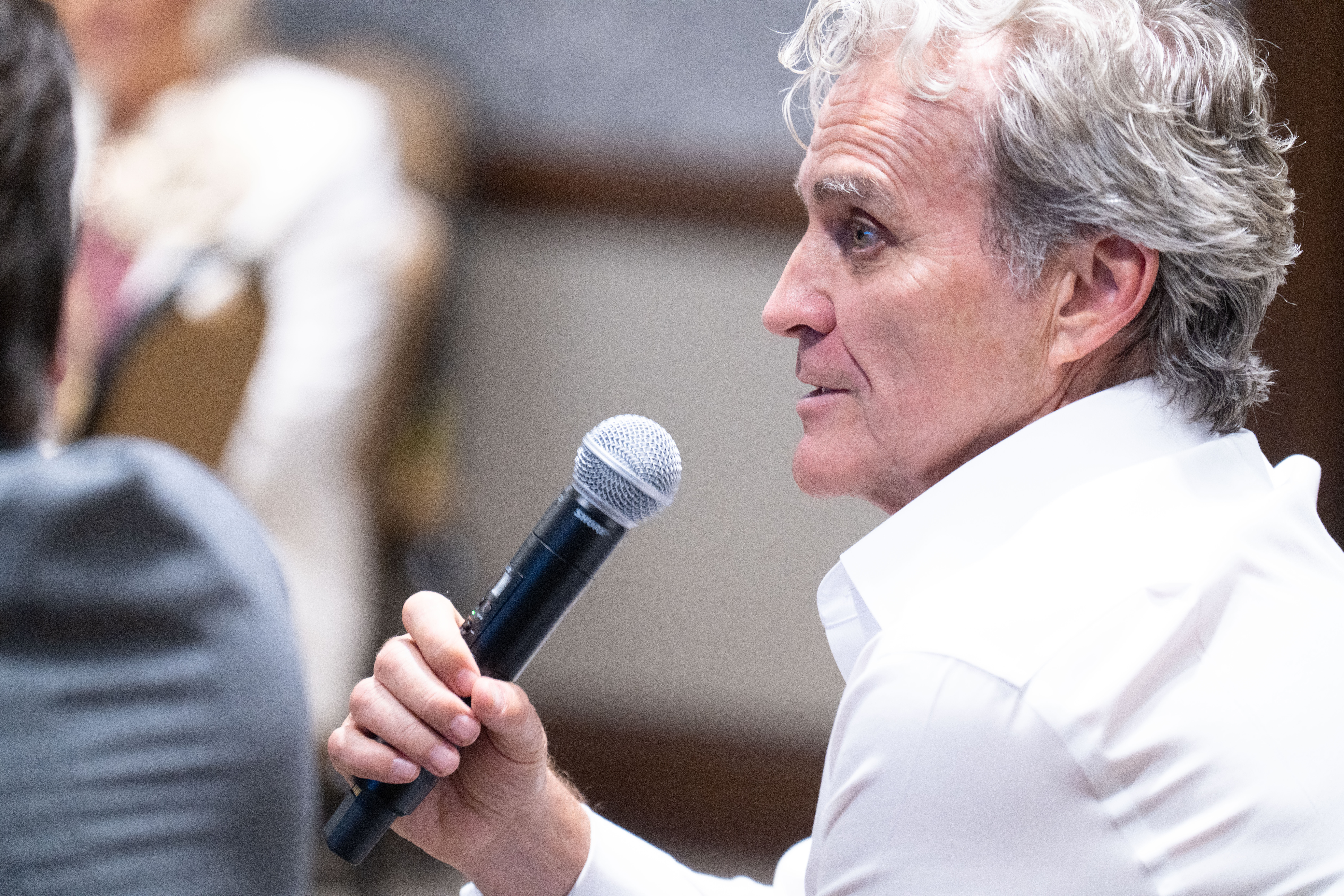
In another keynote, acclaimed journalist and ESPN senior writer Tom Junod explored how simple qualities like truth, grace, and kindness help us become better humans and neighbors.
He learned this simple yet complex lesson from two roles models: his father and Fred Rogers.
Fred Rogers is most famously known as the star of the beloved television show, “Mister Rogers Neighborhood.” Rogers positively influenced generations of young viewers through his simple messages of the importance of kindness and embracing emotional honesty. However, Junod’s relationship with Rogers began when he was assigned to write a feature story on America’s favorite neighbor, highlighting Rogers as a hero.
During his address, Junod reflected on his concept of “manhood” and “humanhood” throughout his life. As he got to know him, Mister Rogers shifted Junod’s outlook on humanity in a different way that his own father had ever taught him. Junod recalls simple acts that Rogers displayed which made him feel recognized and cared for, such as asking intentional questions about Junod and his life, handwritten notes to Junod and even simple phone calls. It was through these quiet gestures that Junod’s understanding of humanity — and what it means to truly connect — was altered.
“In a time of unbridled falsehood and lies, I think the key to being a man is being able to tell the truth,” Junod said. “The key to being a human is to be able to testify to the truth. And what gives you the ability to do both is love. The one who taught me these things was the soft spoken, Fred Rogers.”
Junod later engaged with students through the Student Writing Workshop, where students were given guidance and insight from Junod’s successful career as a journalist.
Continuing to Gather Together
Over the course of the week, more than 35 events highlighted different aspects of being a neighbor including, examining the importance of being a neighbor, knowing and loving our neighbor, and embraces our extended neighbors from other cultures, identities and nations.
- The Arcade Arts Residency, exploring community through arts
- The Sandra Hutchins Creative Writing Awards, recognized excellent student writing across three genres: fiction, creative nonfiction and poetry
- Workshops, luncheons, receptions, table discussions and film screenings
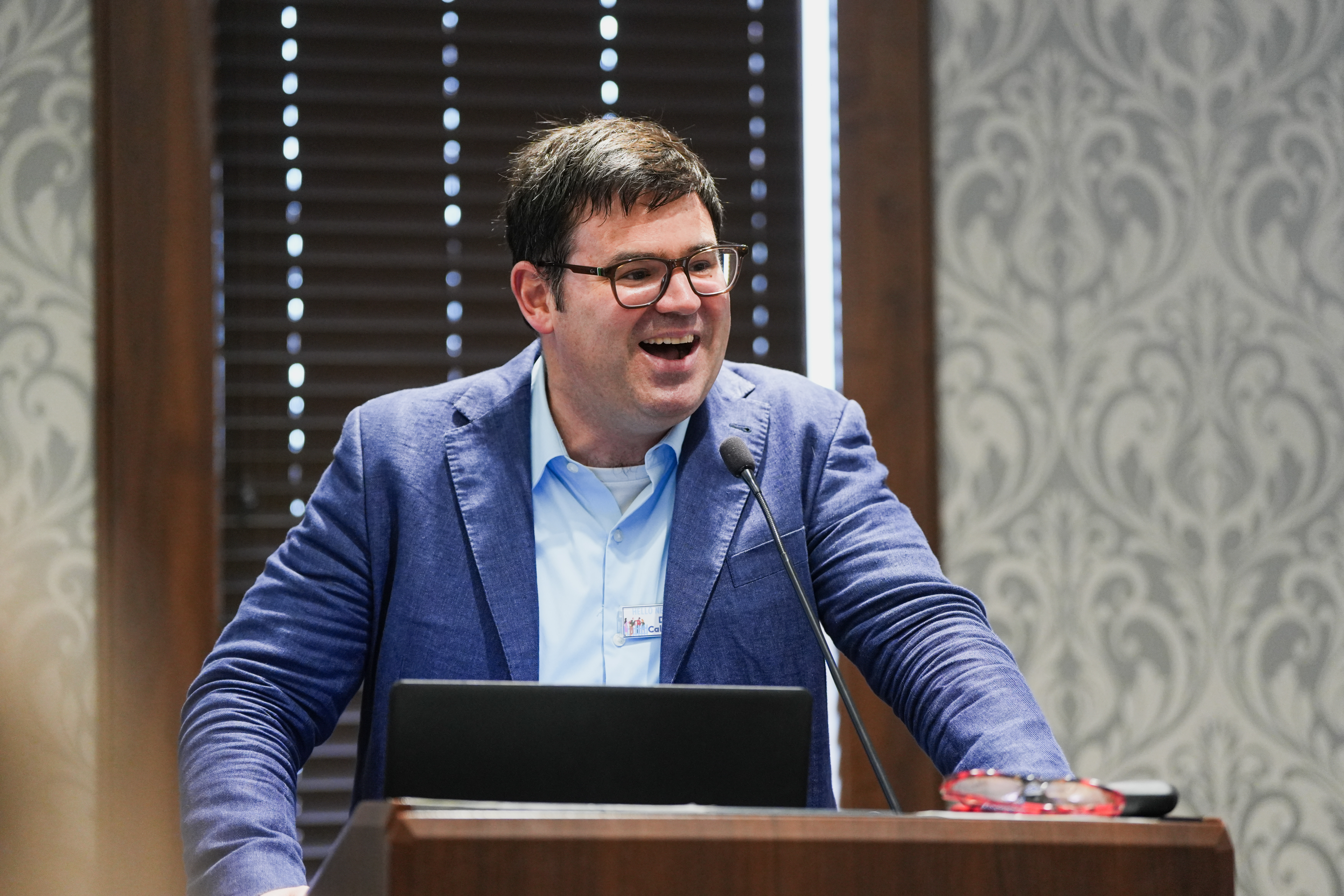
Dr. Eric Calderwood and Dr. C.J. Sentell were also featured symposium speakers. Calderwood offered a historical lens of the legacy of Al-Andalus, the Muslim ruled area of the Iberian Peninsula, and he shared how we can apply lesson from Al-Andalus to our society and neighborhood today. Sentell closed out the symposium, discussing the action of being a neighbor and practicing the politics of hospitality.
By week's end, the questions posed at the symposium's opening —What does it mean to be a neighbor? Who is our neighbor? — felt less abstract. Through stories, scholarship and honest conversation, the Belmont community discovered that being a neighbor is less about proximity and more about intentional presence.
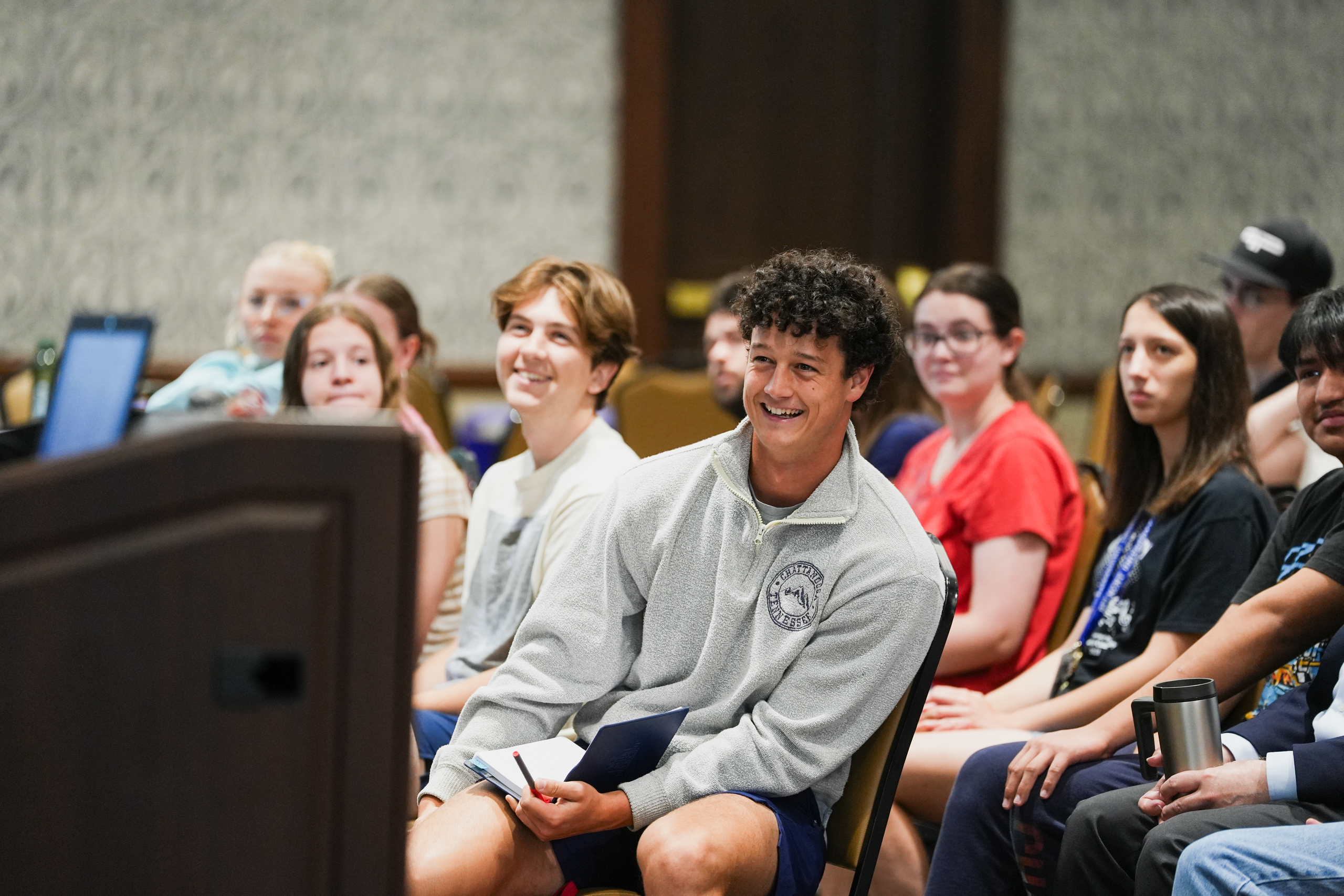
Explore Belmont Humanities, Liberal Arts and Social Sciences!

